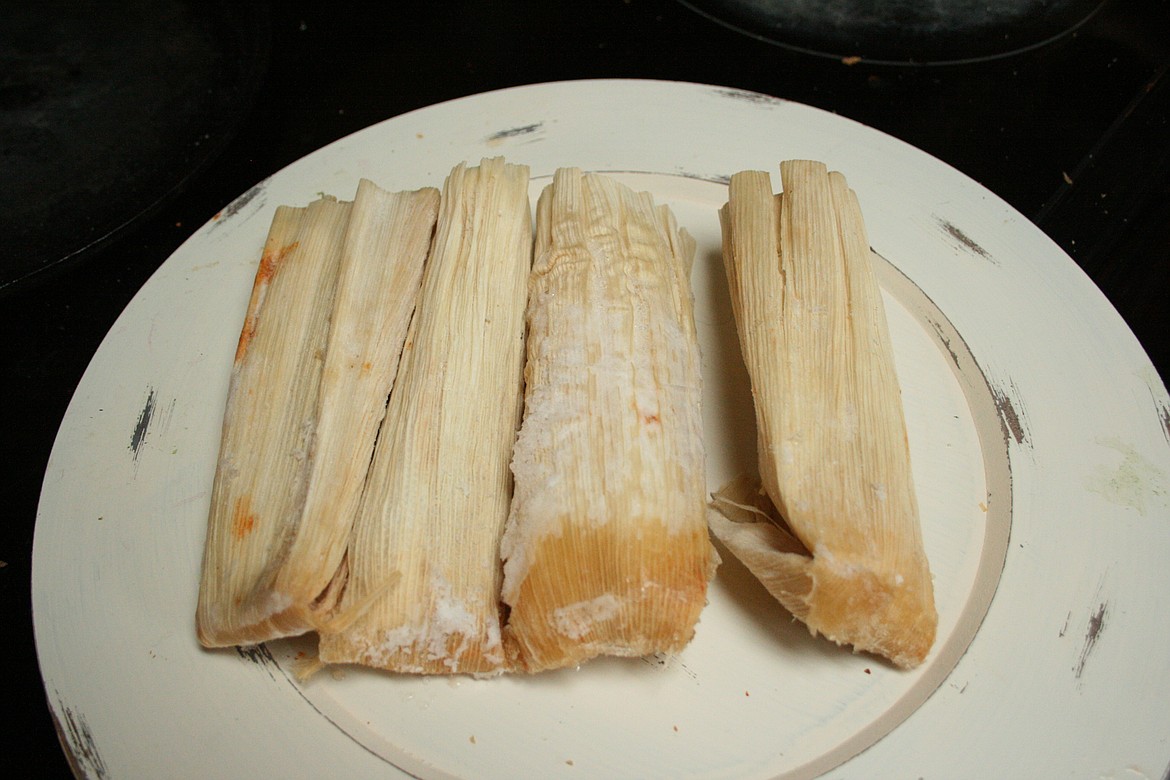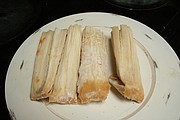Masa appeal: Alicia Factor finds success with small business
MOSES LAKE — Alicia Factor has some plans for her business, working to make it grow and planning for her own store someday. And Alicia’s Tamales Express is all due to her mom.
Her mother, Emma Renteria, was a good cook, and she loved making and eating one of the staples of special occasions in Mexico.
“She was a tamale lover,” Factor said. “She loved tamales. And she got to the point where she got ill, and she couldn’t make any more.”
Factor took care of her mother, and she would express a wish for tamales.
“And I (said), ‘Mom, I don’t know how to do them.’ And she said, ‘I’m going to show you.’ And three, four tries, it got to the point where I was able to satisfy her cravings. That’s where it all started.”
After Renteria died, Factor kept making tamales, and they were a hit wherever she went, she said. She got more experience making tamales, fine-tuned the recipe and became known for her tamale-making skills. Family and friends would ask for them, and eventually, around 2016, the word was getting out.
“People started ordering more, from companies like Simplot, their employees started ordering from me, and then Washington Bean Company, and then some insurance places in town,” she said.
Her brother-in-law encouraged her to think about making a business out of it, but she hesitated. Traditionally, tamales are a special-occasion dish for Christmas and birthdays, Thanksgiving, and New Year’s celebrations. There’s a reason for that, because while tamales seem like a simple dish, they’re not. And Factor said none of her ingredients are packaged.
“Everything is from scratch,” she said. “So, it’s a lot of work. It’s hard making tamales.”
Her sister Estella Segura encouraged her, too, and offered to help. So, Factor thought it over, and talked to inspectors at the Grant County Health District to find out what would be required to sell her tamales commercially.
The answer was a little discouraging, with a lot of restrictions and rules. She tentatively decided against opening a business, but Segura kept encouraging her.
“She said, ‘No, I’m going to help you. We’re going to do this,’” Factor said.
Still she hesitated, because turning it into a business meant making a lot of tamales. But Segura said they could do it, as long as Factor supervised the process. So Factor and Segura opened a business.
“We did it, and it was a success,” she said.
Their first commercial venue was the 2021 Moses Lake Farmers Market. The most popular options at Alicia’s Tamales Express include beef, pork, and bean and cheese with jalapeños. She rents a kitchen at the Grant County Fairgrounds for the assembly process, and they’re cooked at the market.
Factor said she expected a good reception from farmers market customers, but not as good as she got.
“(Customers) would say, ‘Oh, I was just parking my car, and something smelled so good, And I said, I’m going to look for where the smell is coming from. And here it is.’ And we say, ‘Yup, you’re at the right place.’”
They bring what seems like a lot of tamales.
“We take 50 to 60 dozen,” Factor said. “The reason we don’t take more is that we need more hands. That’s all we can do.”
Each Saturday from May through October, the market is open from 8 a.m. to 1 p.m., and Factor said she expected it would take the whole day to sell out. But it didn’t.
“We sell out within the first hour,” she said. “Within the first hour and a few minutes. We’re not even there all the way until one o’clock,” she said.
A tamale starts with a dry corn husk, which is spread with masa, a dough made with ground corn. The cook then adds the filling, which can be savory or sweet, and wraps the mixture in the corn husk. They are cooked in a steamer. It’s not as easy as it might sound, especially when making 600 to 700 tamales.
Factor starts with masa and leavening agents mixed with pork lard and water.
“We just mix and mix for quite a while. By hand,” she said.
She spreads the masa mixture on the corn husk and adds the filling. The tamales go into the steamer for about 90 minutes.
The masa mixture is just right when – well, that’s hard to say.
“I wish I could tell you how (to tell). It’s all in my hands,” Factor said. “And the water and the ingredients, the cooking time, have a lot to do with the (final product).”
A tamale cook benefits from experience, she said.
“You’ve got to know what you’re doing, and believe me, you’ve got to know your recipe,” she said.
For the first year Factor, Segura and their assistants Ramona Urias and Luis F. Segura worked mostly with the same equipment used by home cooks.
“Next year we plan to buy our (commercial) mixers, which will make it much easier,” she said.
Eventually she wants to open her own shop, she said.
“I’m thinking probably in a year or so, opening a small food business,” she said. “It all depends on where we’re at. If everything goes well, I see it as a go.”
She’s sure she’s got a good product.
“We had some people buy one tamale, or two tamales, and we would say, “Are you sure? Because we run out pretty soon.’ And sure enough, they would come back and guess what? We were out of tamales,” she said.





